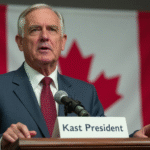Background and Relevance
In a recent meeting between Claudia Sheinbaum, the head of Mexico City’s government, and Mark Carney, the premier of Ontario, Canada, both nations agreed to strengthen their bilateral relationship in areas such as infrastructure, energy, railways, health, security, and migration. The discussion also touched on potential collaboration for the 2026 FIFA World Cup.
Current State of Bilateral Relations
Trade Figures: The bilateral trade between Mexico and Canada stands at a mere $40 billion, with a heavily skewed balance in Mexico’s favor. Mexico exports $34 billion to Canada, while Canada exports only $6 billion to Mexico. This represents less than 5% of total trade for each country.
Shared Challenges: Both countries face the “Gringo Grievance,” being heavily reliant on the U.S. market. 75% of Canadian exports go to the United States, and for Mexico, it’s 80%. The Mexico-Canada trade is minimal compared to their overall trade volumes.
Understanding Mexico – A Canadian Perspective
Former Canadian ambassador Graem Clark emphasized the need for a deeper understanding of Mexico, stating that Canada must move beyond stereotypes like tequila and beaches. He acknowledged Mexico as one of the world’s leading economies.
Canadian Delegation and Potential
The Canadian Prime Minister recognizes the potential of the relationship with Mexico. The delegation accompanying him included CEOs from major Canadian companies with investments in Mexico, such as Scott Thompson (Nova Scotia Bank), Keith Creel (CPKC Railway), Nancy Southern (ATCO), and Francois Poirier (TC Energy).
Historical Context and Recent Developments
The Mexico-Canada relationship has reached 80 years, but 2025 has been one of the most challenging. Ontario Minister Doug Ford’s statements advocating for a bilateral U.S.-Canada agreement over the T-MEC have added complexity.
Canada has faced more difficulties in its relationship with Trump compared to Mexico. While Mexico has seen growth in exports (6.5% increase between January and July), Canada’s exports have fallen (2.9% decrease in the same period).
Investment Opportunities and Challenges
Mexico seeks more Canadian investment, with Canada having invested $46.5 billion in Mexico, primarily in mining, automotive, aerospace, and energy sectors. The meeting discussed potential in healthcare, agriculture, and infrastructure, including invitations to invest in Mexican ports, railways, and energy sectors.
Canadian mining companies have expressed frustration with rule changes implemented during López Obrador’s administration. Mexican authorities, speaking off the record, have cited “inadequate” behavior regarding environmental issues and tax payments.
Future Prospects
Canada and Mexico aim to deepen their relationship, with enormous potential for development. However, this progress will not come at the expense of their relationship with the United States, setting boundaries and defining possible scenarios.
Key Questions and Answers
- What was discussed in the Sheinbaum-Carney meeting? Both nations agreed to strengthen their bilateral relationship in areas like infrastructure, energy, railways, health, security, and migration. They also discussed potential collaboration for the 2026 FIFA World Cup.
- What are the current trade figures between Mexico and Canada? The bilateral trade is $40 billion, with a heavily skewed balance in Mexico’s favor. Mexico exports $34 billion to Canada, while Canada exports only $6 billion to Mexico.
- Why is understanding Mexico crucial for Canada? Former Canadian ambassador Graem Clark emphasized the need for a deeper understanding of Mexico, acknowledging it as one of the world’s leading economies.
- What challenges does Canada face in its relationship with Mexico? Canadian mining companies have expressed frustration with rule changes implemented during López Obrador’s administration.
- What are the future prospects for Mexico-Canada relations? Both nations aim to deepen their relationship, with enormous potential for development. However, progress will not come at the expense of their relationship with the United States.






